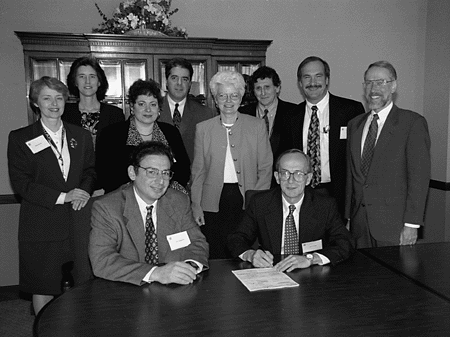|
|
APL Awarded Contract to Provide Biomedical R&D Services to the Federal GovernmentBy Pamela HoughtalingApplied Physics Laboratory |

APL has been awarded a contract worth $45 million over the next five years to provide biomedical research and development services to the federal government. Under the terms of the contract, APL can provide biomedical research, engineering and development services in support of federal biomedicine initiatives ranging from basic and applied research through the preliminary stages of advanced system development.
"The contract will allow the government to place biomedical work at the laboratory in a fast, efficient and cost-effective manner," says John Zader, supervisor of con-tracts administration in the Business and Information Services Department, who oversaw the negotiation of the contract for APL. Not a guarantee of funding, this indefinite delivery, indefinite quantity contract sets a ceiling or maximum level of funds that can be accepted from agency task orders.
 |
| John Gagliardi, of the Defense Supply Center Philadelphia, and John Lordan, of JHU, sign the contract. Standing are Ruth Nimmo, of APL; Anna Maria Dennen, of DSCP; Andrea Nicolucci, of DSCP; Andrew Wechter, of DSCP; Wanda Murphy, Vince Pisacane, John Zader and Gary Smith, all APL. |
"This type of contract helps the government streamline the acquisition process by enabling multiple agencies to use it," says Wanda Murphy, of the Business and Information Services Department, who negotiated the contract.
The contract sponsor is the Defense Supply Center Philadelphia, which will manage the financial side of the contract and provide any technical and administrative support agencies may need in placing task orders. "We're looking forward to a very productive and cooperative relationship," Zader says.
Biomedicine at APL goes back more than 34 years. As Vince Pisacane, assistant director for biomedical programs, explains, APL's work has been in three major areas: basic medical research, medical sensors and instrumentation, and medical informatics and telehealth. Medical devices developed include an ingestible temperature-sensing capsule, fetal heart monitor, rechargeable pacemaker and an implantable medication-dispensing system. Work in information systems has included the development of the Oncology Clinical Information System--a patient database that has been in operation since the early 1980s--and a feasibility demonstration of mobile computing at The Johns Hopkins Hospital.
One of APL's strengths in the biomedical area is its collaboration with School of Medicine, along with the schools of Nursing and Public Health. In 1996, the collaborative relationship was formalized with the creation of the Institute for Advanced Science and Technology in Medicine.
"Another important factor is our location," says Steve Yanek, program area manager with the Institute for Advanced Science and Technology in Medicine, and APL's technical lead for the contract. "We're close to the leading biomedical research, teaching and health care organizations both inside and outside the government. The tremendous resources available enable us to bring added value."
APL has ongoing work in military medicine, specifically in Navy telemedicine and combat casualty care, and ophthalmology research for the Army. "APL's long-standing relationship with the Department of Defense gives us a special understanding of its needs," says Pisacane. "This contract provides a vehicle for expanding our work with all the services."
APL has recently established a senior executive advisory committee for military medicine, which includes retired senior medical officers. "It gives us a way of identifying problems of operational military medicine," says Pisacane, "and how and where we can bring our strengths to bear."
"We would like to do work that contributes to the readiness of the military forces as well as achieves the biomedical research, teaching and patient care missions of federal government organizations," Yanek says. "APL prefers to participate in projects with the capability to improve the quality of care delivery and, at the same time, reduce cost."
| GO TO MAY 17, 1999 TABLE OF CONTENTS. |
| GO TO THE GAZETTE HOMEPAGE. |